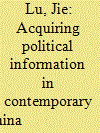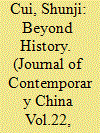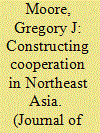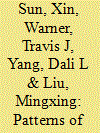|
|
|
Sort Order |
|
|
|
Items / Page
|
|
|
|
|
|
|
| Srl | Item |
| 1 |
ID:
123702


|
|
|
|
|
| Publication |
2013.
|
| Summary/Abstract |
Using complementary information from two national surveys conducted in 2008, i.e. the China Survey and the ABS II Mainland China Survey, this paper presents a comprehensive picture of the media channels that Chinese citizens use for political information, as well as their relative importance as assessed by the Chinese people. Moreover, assisted by multiple regressions, this paper also identifies which groups of Chinese are more likely to use each of these channels for political information. This paper contributes to our understanding on (1) the relative significance of various media channels in contemporary China's political communication; and (2) how Chinese citizens select themselves into specific channels for political information, given their increasing autonomy in acquiring such information from China's changing media.
|
|
|
|
|
|
|
|
|
|
|
|
|
|
|
|
| 2 |
ID:
123704


|
|
|
|
|
| Publication |
2013.
|
| Summary/Abstract |
This article takes the proposition that cooperation in the area of non-traditional security (NTS) can provide the essential window of opportunity for Northeast Asians to move beyond history. To demonstrate, it explores the development of NTS cooperation in Northeast Asia, paying particular attention to Sino-Japanese cooperation in the environmental and disaster areas. It then examines the relationship between NTS cooperation and the construction of a regional international society in Northeast Asia. It argues that the importance of NTS cooperation is twofold. First, in a region where historical animosities remain high, NTS issues can avoid sensitive areas and find common ground for cooperation that traditional security approaches would be unable to envisage. Second, NTS cooperation has turned people-to-people relations in a more prominent and conciliatory direction, and enhanced human security consideration, thus taking things further than the indirect consequences of functionalism.
|
|
|
|
|
|
|
|
|
|
|
|
|
|
|
|
| 3 |
ID:
123705


|
|
|
|
|
| Publication |
2013.
|
| Summary/Abstract |
What are the obstacles to greater cooperation in Northeast Asia and why have the nations of the region not been entirely successful in moving beyond history, toward greater cooperation? Conducting a brief survey of Northeast Asian IR and power alignment patterns from the Imperial/Dynastic era to the present, this essay utilizes the constructivist approach to assess regional alignment patterns in Northeast Asian history corresponding to six historical time periods, ranging from Ming China to the present. It does so by employing Wendt's system-level cultures of anarchy (Hobbesian, Lockean and Kantian cultures) at the dyadic/second level of analysis and the regional level of analysis (level 2.5), rating the various eras as to levels of cooperation vs enmity, with an eye to identifying the reasons for today's tension points. It concludes that despite such tension points and unresolved historical issues, anarchy in Northeast Asia today is not Hobbesian (enmity), but rather Lockean (rivalry). Consequently and first, war, nuclear proliferation and security spirals may be avoidable with proper sensitivity to the issues that continue to pose as obstacles to regional cooperation, including historical grievances, uncertainties over China's rise and the US role in the region, the North Korean nuclear issue and others. Second, attention to improving the dyadic cultures (China-Japan, South Korea-North Korea, etc.) that together comprise the region's relational culture (either Hobbesian, Lockean or Kantian) make greater regional cooperation possible and even more likely.
|
|
|
|
|
|
|
|
|
|
|
|
|
|
|
|
| 4 |
ID:
123700


|
|
|
|
|
| Publication |
2013.
|
| Summary/Abstract |
The past two decades have witnessed increasing use of the concept of 'bureaucratic capitalism' to explain various endemic problems in China, including corruption and social inequalities. Yet, scant attention has been paid to the rise of key bureaucratic capitalists and the state corporations under their control. Neither has there been adequate discussion of the recent form of bureaucratic capitalism in contradistinction to that of the previous forms evolving in the republican and early reform periods. In question therefore is a small circle of bureaucratic bourgeoisie who are children, close relatives or protégés of top political leaders. They have come to control key state-corporation apparatuses, and some of whom possess close ties with the military. In conclusion, the future implications of this emergent form of bureaucratic capitalism on Chinese politics will also be discussed.
|
|
|
|
|
|
|
|
|
|
|
|
|
|
|
|
| 5 |
ID:
123695


|
|
|
|
|
| Publication |
2013.
|
| Summary/Abstract |
A 'dual-power structure' governs the Chinese countryside. Branch committees of the Chinese Communist Party, traditionally the centers of power in the villages, increasingly share their authority with elected villagers' committees. Seeking to illuminate the factors contributing to the division of authority between these 'two committees', we view Party branch secretaries and the chairs of villagers' committees as the agents of two distinct principals. Party branch secretaries tend to derive their authority from township authorities, while villagers' committee chairs derive theirs from their village electorates. We predict that the division of authority between the two committees varies with (a) the relative levels of activism exhibited by the principals; and (b) the perceived legitimacy of the agents, as determined by their method of s/election. Through analysis of a unique dataset, we test four hypotheses derived from this framework. Our findings contribute to a better understanding of the 'exercise of power' in rural China and shed light on the dynamics of China's political evolution.
|
|
|
|
|
|
|
|
|
|
|
|
|
|
|
|
| 6 |
ID:
123708


|
|
|
|
|
| Publication |
2013.
|
| Summary/Abstract |
Road to Revival, as the third musical epic in the People's Republican history, was produced and publicized in 2009 in order to celebrate the sixtieth anniversary of the PRC. Like the previous two epics, Revival expressed and promoted the official ideology of the time. Through a close reading of Revival's artistic presentation and comparison with the two similar musical epics, The East Is Red and The Laud for the Chinese Revolution, this article demonstrates that traditional political theory such as the 'mandate of heaven' (tianming) is now revitalizing and being adapted to construct the party's legitimacy. In constructing a new legitimacy for the party, Revival does not only depoliticize and recast the histories of the CCP and modern China but also tries to establish a foundation for the party's rule by displaying its successful performance in governance which has gradually become the groundwork in shaping the party's new legitimacy.
|
|
|
|
|
|
|
|
|
|
|
|
|
|
|
|
| 7 |
ID:
123697


|
|
|
|
|
| Publication |
2013.
|
| Summary/Abstract |
China is already outpacing Russia, which is encountering ever more difficulties in trying to arrange a continental bloc of satellite states. While it may not be possible for China to organize its own version of such a bloc given the deep-rooted regional fears and apprehensions about Chinese objectives, in the coming years it will probably be the primary foreign economic presence in Central Asia, able to cash in on the political advantages that accrue to any such power
|
|
|
|
|
|
|
|
|
|
|
|
|
|
|
|
| 8 |
ID:
123699


|
|
|
|
|
| Publication |
2013.
|
| Summary/Abstract |
Governance is a hot topic in China, as well as among political scientists. Ways of thinking about it can be improved. This essay offers a 'neo-functionalist' method to test for successful or unsuccessful governance of reform stability in China. It takes account of the need for participation in effective governance. Steering a state (or any part of a state) requires attention to multiple sizes of polity-especially several medial sizes in a country as large as China. Governance has varied over time during the 'reform' era, when anti-reform conservatives have remained important in many nested political networks. The paper shows variation of governance over time, over sizes of polity and over four sample governance functions: managing the economy, maintaining orderly stability, linking 'social' parts of the polity to the government, and choosing cadres. It shows how these categories exhaust a logical field that is at least implicit in any analysis of governance roles, and it suggests the value of a 'circulation of elites' paradigm when thinking about governance success or failure.
|
|
|
|
|
|
|
|
|
|
|
|
|
|
|
|
| 9 |
ID:
123703


|
|
|
|
|
| Publication |
2013.
|
| Summary/Abstract |
This paper investigates macro-level sources of variations across countries regrading China's national image, as measured by the proportion of the public in each of 35 countries that expressed a favorable view of China in the 2007 Pew Global Attitudes Survey. It turns out that several expected factors have no significant measurable impact on China's image: not the extent of strategic ties between China and a given country; not the political system of that country; not the extent of Chinese investment in the country; and not the number of Confucius institutes and classrooms in that country. The only macro-level factor we find to affect China's image in a country is that country's level of economic and social development, as measured by the UN Human Development Index. Controlling for the other factors, publics in poor or developing countries are much more likely to have a favorable image of China than publics in economically advanced countries. Some implications of our findings are discussed.
|
|
|
|
|
|
|
|
|
|
|
|
|
|
|
|
|
|
|
|
|